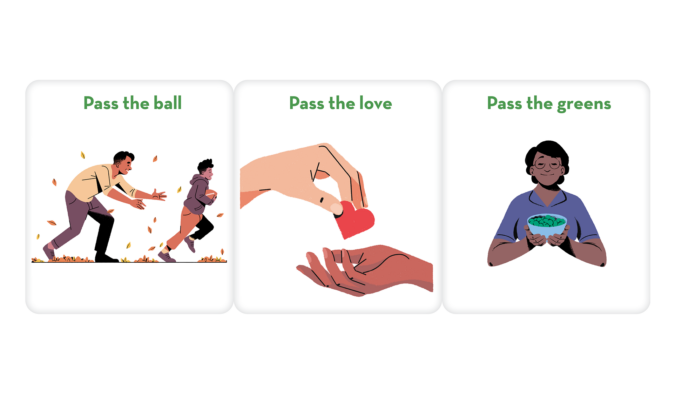Start Every Week With a Healthy Activity to Help Prevent Diabetes
How Healthy Monday Can Make a Difference
Small steps are key. Using Monday as a weekly cue to commit or recommit to healthy behavior is an evidence-based way to stay on track with your health goals. By incorporating more healthy eating, physical activity, regular sleep, and mental health self-care practices into your weekly routine, you can better prevent or manage type 2 diabetes. Read more about diabetes and prediabetes.
Read the full intro to diabetes and prediabetes.
Content written and reviewed by Sara Benjamin-Neelon, PhD, RD, MPH, JD, Director of the Lerner Center for Public Health Promotion at the Johns Hopkins Bloomberg School of Public Health; and Meghan Ames, MSPH, RD, Community Program Manager, the Lerner Center for Public Health Promotion at the Johns Hopkins Bloomberg School of Public Health.
Download our Diabetes Prevention Resources

Healthy Monday for Diabetes Prevention
Don't Let Diet Beat Us!
The best way to prevent or manage diabetes is through your diet. Our Don't Let Diet Beat Us materials encourage healthy choices by highlighting "hero" foods shown to help reduce the risk of diabetes, and illustrating the benefits of starting the week with a Meatless Monday.

Don't Let Diet Beat Us
Following a healthy diet is key to maintaining a healthy weight, managing your blood sugar, and preventing complications from diabetes. Get inspired to power up your diet with our new Don't Let Diet Beat Us materials.

Eat Well
Plant-based diets may also help in the prevention or treatment of diabetes. Find out how Meatless Monday can make a difference in your health and encourage healthy eating throughout the week.
Move More and Stress Less for Diabetes Prevention
Our Move It Monday and DeStress Monday diabetes prevention practices encourage exercise and stress management through fun, simple activities and promotional graphics. Use them to make your diabetes prevention program more colorful and engaging.

Move More
Physical activity helps manage blood sugar. It will also help you maintain a healthy weight, sleep better, and feel healthier. Our Move More materials and practices have all the tools you need to get into a Move It Monday groove.

Stress Less
Reduce stress and improve your sleep through exercise, meditation, and mindfulness. Our simple, effective DeStress Monday practices are designed to help encourage new stress management and self-care habits, starting on Monday.
Diabetes and prediabetes
An estimated 1 in 3 US adults have prediabetes, and of these 88 million people, over 80% aren’t aware of their condition. People with prediabetes are at increased risk for developing type 2 diabetes, heart disease, and stroke. Emerging research also suggests that people with diabetes may be more at-risk for severe COVID-19 symptoms, if infected.
The good news is that by committing to a few simple lifestyle changes, people at-risk or with prediabetes can dramatically reduce their likelihood of developing type 2 diabetes or other major health complications.
What is type 2 diabetes?
Type 2 diabetes impacts the body’s metabolism of sugar. In a healthy person, insulin aids in the absorption of sugar from foods, so it can be used by the body for energy. In people with Type 2 diabetes, however, the body doesn’t produce enough insulin or respond to insulin properly. As a result, sugars build up in the blood stream. High blood sugar can cause many health complications, including blindness or other serious eye problems, kidney disease, nerve damage, and other health issues.
Type 2 diabetes is diagnosed by elevated blood sugar levels. The hemoglobin A1C blood test indicates average blood sugar levels over the past three months. People with an A1C above 6.5% are diagnosed with type 2 diabetes, and those with an A1C between 5.7% – 6.4% are diagnosed with prediabetes. People with prediabetes have a 50% chance of developing type 2 diabetes within 5 to 10 years. Because some complications develop without symptoms, it’s important to have your doctor screen you for prediabetes regularly.
How do I prevent type 2 diabetes?
Two major risk factors that dramatically increase the risk of diabetes are being overweight and being inactive. By adopting a healthy lifestyle, people can reduce the impact of complications from diabetes and decrease the chance that prediabetes turns into diabetes. The Diabetes Prevention Program or DPP helps people with prediabetes maintain a healthy weight through regular physical activity, healthy food choices, and behavioral support. Participating in this program can reduce your risk of diabetes by over 50%.